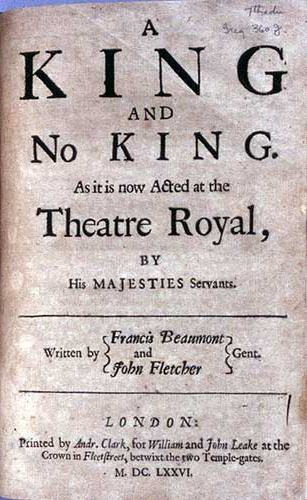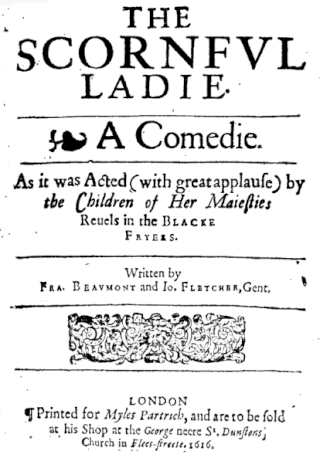Related Research Articles
The King's Men was the acting company to which William Shakespeare (1564–1616) belonged for most of his career. Formerly known as the Lord Chamberlain's Men during the reign of Queen Elizabeth I, they became the King's Men in 1603 when King James I ascended the throne and became the company's patron.

Francis Beaumont was a dramatist in the English Renaissance theatre, most famous for his collaborations with John Fletcher.

Beaumont and Fletcher were the English dramatists Francis Beaumont and John Fletcher, who collaborated in their writing during the reign of James I (1603–25).

John Fletcher was an English playwright. Following William Shakespeare as house playwright for the King's Men, he was among the most prolific and influential dramatists of his day; during his lifetime and in the Stuart Restoration, his fame rivalled Shakespeare's. Fletcher collaborated in writing plays, chiefly with Francis Beaumont or Philip Massinger, but also with Shakespeare and others.
The Woman's Prize, or the Tamer Tamed is a Jacobean comedy written by John Fletcher. It was first published in the first Beaumont and Fletcher folio of 1647, though it was written several decades earlier. There is no doubt that the play is the work of Fletcher alone; his highly distinctive and characteristic pattern of linguistic preferences is continuous through the text.
The Custom of the Country is a Jacobean stage play, a tragicomedy written by John Fletcher and Philip Massinger, originally published in 1647 in the first Beaumont and Fletcher folio.
Cupid's Revenge is a Jacobean tragedy written by Francis Beaumont and John Fletcher. It was a popular success that influenced subsequent works by other authors.
The Beaumont and Fletcher folios are two large folio collections of the stage plays of John Fletcher and his collaborators. The first was issued in 1647, and the second in 1679. The two collections were important in preserving many works of English Renaissance drama.

Philaster, or Love Lies a-Bleeding is an early Jacobean era stage play, a tragicomedy written by Francis Beaumont and John Fletcher. One of the duo's earliest successes, the play helped to establish the trend for tragicomedy that was a powerful influence in early Stuart-era drama.
The Fair Maid of the Inn is an early 17th-century stage play. A comedy in the canon of John Fletcher and his collaborators, it was originally published in the first Beaumont and Fletcher folio of 1647. Uncertainties of the play's date, authorship, and sources make it one of the most widely disputed works in English Renaissance drama.
Four Plays, or Moral Representations, in One is a Jacobean era stage play, one of the dramatic works in the canon of John Fletcher and his collaborators. Initially published in the first Beaumont and Fletcher folio of 1647, the play is notable both for its unusual form and for the question of its authorship.
The Spanish Curate is a late Jacobean era stage play, a comedy written by John Fletcher and Philip Massinger. It premiered on the stage in 1622, and was first published in 1647.

The Maid in the Mill is a late Jacobean era stage play, a comedy written by John Fletcher and William Rowley. It was initially published in the first Beaumont and Fletcher folio of 1647.
Wit Without Money is a Jacobean era stage play, a comedy written by John Fletcher, and first published in 1639.
Love's Pilgrimage is a Jacobean era stage play, a tragicomedy by Francis Beaumont and John Fletcher. The play is unusual in their canon, in that its opening scene contains material from Ben Jonson's 1629 comedy The New Inn.

A King and No King is a Jacobean era stage play, a tragicomedy written by Francis Beaumont and John Fletcher and first published in 1619. It has traditionally been among the most highly praised and popular works in the canon of Fletcher and his collaborators.
The Captain is the title of a Jacobean era stage play, a comedy written by Francis Beaumont and John Fletcher. It was originally published in the first Beaumont and Fletcher folio of 1647.

The Scornful Lady is a Jacobean era stage play, a comedy written by Francis Beaumont and John Fletcher, and first published in 1616, the year of Beaumont's death. It was one of the pair's most popular, often revived, and frequently reprinted works.
The Noble Gentleman is a Jacobean era stage play, a comedy in the canon of John Fletcher and his collaborators that was first published in the first Beaumont and Fletcher folio of 1647. It is one of the plays in Fletcher's canon that presents significant uncertainties about its date and authorship.

Monsieur Thomas is a Jacobean era stage play, a comedy written by John Fletcher that was first published in 1639.
References
- ↑ E. K. Chambers, The Elizabethan Stage, 4 Volumes, Oxford, Clarendon Press, 1923; Vol. 3, p. 223.
- ↑ Terence P. Logan and Denzell S. Smith, eds., The Later Jacobean and Caroline Dramatists: A Survey and Bibliography of Recent Studies in English Renaissance Drama, Lincoln, NE, University of Nebraska Press, 1978; p. 58.
- ↑ E. H. C. Oliphant, The Plays of Beaumont and Fletcher: An Attempt to Determine Their Respective Shares and the Shares of Others. , New Haven, Yale University Press, 1927; p. 269.
- ↑ Chambers, Vol. 3, p. 224.
- ↑ George Bernard Shaw, Dramatic Opinions and Essays, with an Apology, New York, Brentano, 1907; pp. 418–28.